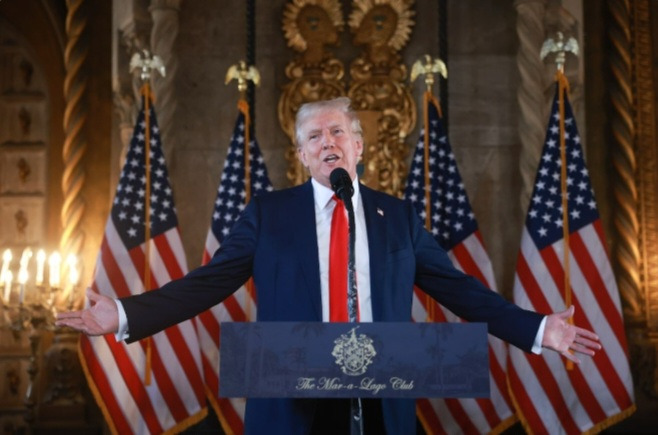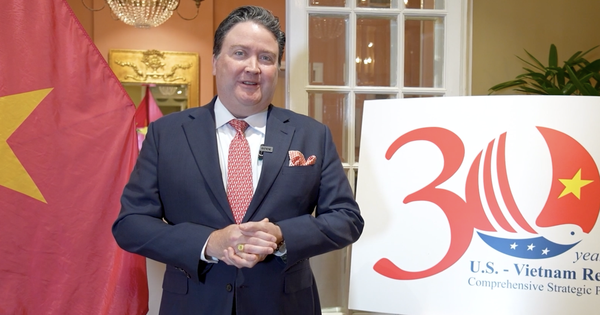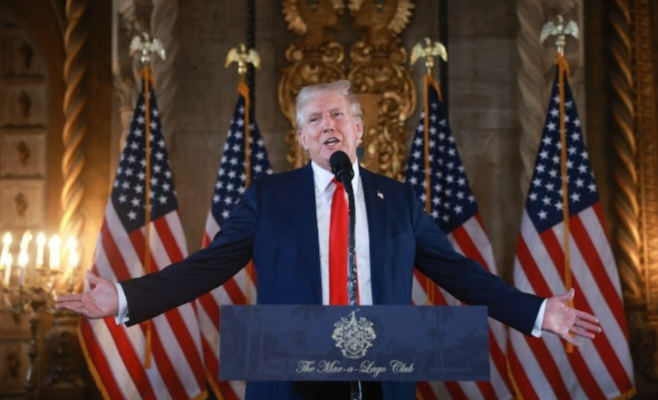(CLO) US President Donald Trump announced that he will impose a 25% tax on imports from Canada and Mexico and a 10% tax on goods from China, effective from February 1.
Trump has said the move is aimed at boosting domestic production, reducing imports and increasing federal revenue. He has also used tariffs as a way to pressure Canada, Mexico and China to cooperate more closely on illegal immigration and preventing fentanyl trafficking into the United States.
“Starting tomorrow, these tariffs will go into effect,” White House press secretary Karoline Leavitt said on January 31. Mr. Trump later stressed to reporters in the Oval Office that there was nothing that could stop the tariffs from being implemented.
Mr Trump said he was considering exempting or lowering tariffs on oil from Canada and Mexico. "I'll probably cut the tariffs a little bit on that. We think it'll be around 10%," he said.
The US imported about 4.6 million barrels of oil per day from Canada and 563,000 barrels from Mexico, while domestic production reached nearly 13.5 million barrels per day in October last year, according to the US Energy Information Administration.
In addition to tariffs on imports from the three countries, Mr. Trump announced that he would continue to impose tariffs on computer chips, oil and gas, copper and possibly the European Union. He expected the additional tariffs to take effect around February 17.

US President Donald Trump. Photo: X
The White House announcement immediately sent stock markets reeling. The S&P 500 plunged, giving up most of its gains for the day as investors worried about the negative impact of tariffs on economic growth.
The decision has raised concerns about the risk of rapidly rising prices for consumers. While Mr. Trump has hinted that he may ease the impact on imported oil, analysts warn that tariffs could disrupt supply chains and push up inflation.
Imposing tariffs on imported oil could increase fuel costs, directly affecting the prices of gasoline and consumer goods in the US.
Senate Democratic leader Chuck Schumer warned that tariffs could raise prices on everything from food to gasoline to cars, making it harder for middle-class families. Tariffs could also push up prices, affecting many important industries such as autos, energy, lumber and agriculture.
Canada, Mexico and China have all warned of retaliation if the US implements the new tariffs.
Canadian Prime Minister Justin Trudeau said Ottawa was ready to respond immediately if Trump did impose tariffs, saying the tariffs could have “catastrophic consequences” for the US, raising the cost of goods and putting American jobs at risk.
Mexican President Claudia Sheinbaum also said her government had several options to deal with Washington's moves. "We will always defend Mexico's dignity and sovereignty, maintaining an equal dialogue without depending on the United States," she said.
On the Chinese side, Liu Pengyu, a spokesman for the country's embassy in Washington, called on the US to resolve differences through dialogue instead of tariffs. "No one wins in a trade war or tariffs. This is not beneficial to either country or the world economy," he said.
Hoai Phuong (according to Reuters, SCMP, AFP)
Source: https://www.congluan.vn/tong-thong-my-se-ap-thue-manh-voi-canada-mexico-va-trung-quoc-vao-hom-nay-post332581.html






















![[Photo] Beijing residents excitedly celebrate the Spring Festival of the Year of the Snake](https://vstatic.vietnam.vn/vietnam/resource/IMAGE/2025/2/1/70ca6218865e47ef837d7a26a2d5e1fa)


































Comment (0)